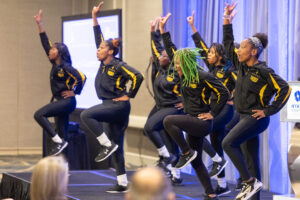ACGME-Gold DeWitt (Bud) C. Baldwin, Jr. Award
What are some of the best ways to enhance the compassionate practice of medicine? How do you make sure the culture of an institution values caring? This is the first in a series of interviews with the three winners of the 2017 DeWitt C. Baldwin, Jr. Award. The second interview focused on honoree Vanderbilt University Medical Center, and the third on Virginia Commonwealth University. By highlighting their practices for teaching and implementing compassionate, collaborative, and scientifically excellent practice, we hope to share and facilitate widespread adoption of replicable humanistic education and practice.
A Joint Venture
 The Baldwin Award is jointly sponsored by the Arnold P. Gold Foundation and the Accreditation Council for Graduate Medical Education (ACGME), and named for Dr. Bud Baldwin, a pioneer in inter-professional education and collaborative practice. The award recognizes accredited residency and fellowship sponsors that foster supportive and humanistic environments for medical education and patient care, contributing to the personal and professional development of learners.
The Baldwin Award is jointly sponsored by the Arnold P. Gold Foundation and the Accreditation Council for Graduate Medical Education (ACGME), and named for Dr. Bud Baldwin, a pioneer in inter-professional education and collaborative practice. The award recognizes accredited residency and fellowship sponsors that foster supportive and humanistic environments for medical education and patient care, contributing to the personal and professional development of learners.
Of the 60 institutions invited to apply for this award, six were selected as finalists and participated in an on-site visit. During the site-visit, each institution exhibited their humanistic culture through interviews with leadership, residents, nurses, administrative, technical, and other staff. The awardees demonstrated a shared commitment to exceed the accepted standards of care. The winners had created impressive institutional cultures that promoted wellness without stigmatization. One important question kept coming to mind: how did they manage to do this so well?
Building the Right Team at Montana Family Medicine Residency
Montana Family Medicine Residency was one of three 2017 Baldwin Award winners. This sponsoring institution is a consortium model, with RiverStone Health, St Vincent Healthcare and Billings Clinic as the three consortium members. In an interview with the Gold Foundation, Montana Family Medicine DIO and former residency director Dr. Roxanne Fahrenwald and CEO John Felton shared their experiences of creating a culture of caring at RiverStone Health, the home base for the residents.
One of their major insights was the importance of bringing the right people to the table. Dr. Fahrenwald noted that part of the selection criteria for residents includes identification of values that are consistent with medicine as a service profession that brings care to the community. Residents are selected based on their desire to provide care for the underserved. “We pay a lot of attention to people’s skillsets, but also mindset, value and belief systems,” she stated. As Mr. Felton put it, this emphasis on selecting for humanistic traits is one of the reasons that “the sense of community is built into the DNA of our health delivery systems.”
Having the right team is important, but Dr. Fahrenwald and Mr. Felton have devised some strategies to maintain the culture of caring as well. “One of the most valuable tools we have is storytelling,” Mr. Felton explained. “We have a section at the end of every staff meeting called living the mission, which is always a story about someone going the extra mile for a patient or helping a coworker. You have to make the fundamental mission of your organization a living thing that invigorates people, and stories can really drive this.”
A Culture of Caring for the Team
RiverStone Health has also set up a confidential employee financial hardship fund, which has distributed over $130,000 to staff in emergency situations. The money for the fund is raised by a committee of volunteer staff members. “We recognize that we have to take care of each other in order to take care of our patients,” Mr. Felton said. “We take culture very seriously and put a lot of resources into proactively building it.” These institutional actions are supported and enhanced by leaders who are committed to promoting humanism. “It’s important to ‘walk the walk’,” Dr. Fahrenwald added. “We work alongside our residents because it’s important for them to know that their effort is valued. We would never ask residents to do things we would not do ourselves.”
The culture that the leaders at RiverStone Health have created has already reaped great rewards. The 380-person staff regularly receives over 700 thank-you notes per month from coworkers and patients. When RiverStone Health began fundraising for a new clinic building, the employees raised over $400,000 for the project, an average of over $1,000 per employee. This is tangible evidence for the value of creating a culture that inspires people to be invested in the institution.
Size Doesn’t Matter
Recognition by the Gold Foundation and ACGME has been valuable for the awardees. “We think that the Baldwin Award recognition is really a validation for our community’s investment in GME and service,” Mr. Felton said. Noting that the other awardees were much larger institutions, he added, “teaching people to be humanistic isn’t a function of size, it’s a function of what you believe in.” For Dr. Fahrenwald, these successes highlight the excellent quality of teaching that can happen in smaller programs. “I hope that other small single-program institutions in little cities all over the U.S. see this as a validation for this training model as well.”
For further information, comments, or questions, please contact the Gold Foundation, ACGME, or RiverStone Health.

